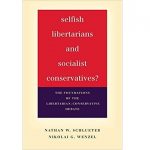Discussions of the principles of the American founding are an important part of modern conservatism. Speeches by conservatives are regularly filled with copious references to the Constitution, individual rights, and freedom. This is quite understandable; conservatives of all nations work to conserve the good and just elements of the regimes under which they live and pass them on to their posterity. American conservatives seek to conserve the principles of the Declaration of Independence and the institutional structures of the Constitution so that future generations of Americans may share in the blessings of liberty enjoyed, however imperfectly, by past generations.
Discussions of principles loom large in the rhetoric of modern conservatism in part because generations of liberals and progressives have continually denigrated the principles on which this country is founded. For example, during a speech last fall, Senator Bernie Sanders told an audience at Liberty University that America was founded on “racist principles.” Democratic lawmakers in the Louisiana House of Representatives ridiculed the Declaration of Independence as sexist and racist in a recent House session. State Rep. Barbara Norton went so far as to claim that the principle that all men are created equal is “teaching . . . a lie.” Back in 1911, Progressive Woodrow Wilson explained, “If you want to understand the real Declaration of Independence, do not repeat the preface.” The preface, of course, contains such supposedly unimportant teachings as that all men are created equal and that just government is based on the consent of the governed.
Upholding the principles that undergird the nation is undoubtedly a pivotal part of the conservative project. However, in recent decades, conservatives have become focused almost exclusively on citing principles rather than building a practical political project. Repeated invocations of Ronald Reagan and the Constitution do not directly speak to the myriad challenges Americans face. They don’t tell us how to fix the bloated tax code, rein in the administrative state, or craft an immigration policy that is consistent with the reality of preserving a nation-state.
The conservative movement has become increasingly irrelevant not only to a clear majority of Americans but even to a clear majority of Republicans. This is obvious when considering the success of Donald Trump. While many of his opponents in the GOP primaries spoke at length about conservative principles, Trump instead attacked core assumptions of movement conservatism. Rather than discussing the history of the Democratic Party with respect to slavery or giving extended remarks about freedom, Trump put forward general policies he argued would help to improve the lives of citizens.
Start your day with Public Discourse
Sign up and get our daily essays sent straight to your inbox.Conservatives hoping that Trump’s repudiation of movement conservatism is just a blip on the radar should reassess their rhetorical approach. They should understand that an American political movement that leans too heavily on principles aggravates the bad tendencies inherent in our democratic regime and confuses principles and the policies from which they are derived.
Tocqueville on the Problems That Thinking in Principles Can Pose
An undue focus on principles gives in to the worst tendencies inherent in democratic nations. In his magnum opus Democracy in America, Alexis de Tocqueville observes that man is inclined by his nature to think in general ideas or principles. Because man is not God and thus cannot comprehend everything in its individual fullness, he must sometimes use general ideas in order to comprehend reality. As Tocqueville argues, thinking in general ideas is “admirable in that they permit the human mind to bring rapid judgments to a great number of objects at one time.”
According to Tocqueville, Americans especially take much “pleasure in” the use of “general ideas.” This is due to our natural craving for equality, which makes us want to be alike in virtually every respect, possessing the same rights and freedoms as our fellow citizens. But because this craving cannot ever fully be satiated, envy begins to grow within the people. As Tocqueville notes, democratic institutions “awaken and flatter the passion for equality without ever being able to satisfy it entirely.” Like the punishment of Sisyphus, whom the Greek gods condemned to roll a rock up a hill only to have it fall back down again, democracy holds out an object that man eternally desires but can never attain.
A symptom of this general lust for equality is an increase in the use of general ideas among the populace. Tocqueville notes that this will cause “incomplete notions” to be lodged in the minds of citizens and will lead to a loss of “exactness.” Left unchecked, the use of general ideas with increased frequency will lead to unclear thinking and inflame the passions of the people as they fight over things of no consequence. These symptoms can already be witnessed in our current policy debates.
Take, for example, the question of immigration policy. It is popular among a certain segment of conservatives to tout cosmopolitan sentiments that are focused on humanity rather than securing the interests of the citizens of this nation. But truisms such as the glib notion that “we are a nation of immigrants” ignore the fact that a nation must be able to control its borders. Immigration policy should be centered on whether or not those who want to immigrate to our shores have cultural habits that are consistent with American principles and practices. Securing the blessings of liberty for ourselves and our posterity is impossible without an essential set of virtues, habits, and mores within the people at large.
Basing public policy on hazy abstractions will gradually sap our ability to understand the uncommon habits of character and mores that are necessary to preserving our regime. Clearly, indulging in too many discussions of principles and ignoring practical policy questions will only exacerbate the harmful tendencies inherent in our democratic form of government.
The Difference Between Principle and Prudence
In addition, thinking only about principles can cause conservatives to elevate every idea they hold dear to the level of a principle. For example, free trade is often considered a key conservative principle. Any questioning of free trade is roundly condemned from all corners of movement conservatism. Conservatives routinely argue that the negative consequences of globalism cannot be combated without a trade war. Any talk of returning manufacturing jobs back to the US is labeled as nostalgia for a long lost past that will never return.
While free trade might be the right policy for certain times and circumstances, it is not the answer for every exigency that our nation encounters. Conservative statesman such as Alexander Hamilton and Abraham Lincoln advocated policies outside the bounds of free trade economics. In his Report on Manufacturers, Hamilton called for government intervention to help prop up the weak manufacturing industry. Lincoln, along with his mentor Henry Clay, called for high trade tariffs throughout his public life. Now, the policies Hamilton and Lincoln advocated are not necessarily the answers to our current problems. However, these examples do demonstrate that conservative statesmen must use prudence to secure the interests of the nation in any given situation. Policies must respond to current circumstances—they cannot be themselves elevated to the level of an unchanging principle.
The dogmatism with which conservatives view their principles is a symptom of a rejection of prudence in politics. In Tocqueville’s pithy phrase, conservatives have become “slaves to slogans.” Modern conservatism has gradually morphed into an ideology that cannot speak to changing realities.
The ideological character of modern conservatism sits in stark contrast to how past generations of conservatives viewed the conservative project. As Russell Kirk once wrote, conservatism is not “a system of ideological dogmata.” Channeling the American founders and Edmund Burke, past generations of conservatives viewed prudence as the supreme virtue of politics. They knew that fulfilling the high and noble ends of politics—i.e., securing the safety and happiness of the citizens who inhabit the regime—depends on the ability of statesmen to apply unchanging principles to changing realities through the use of prudence.
Principles without prudence therefore lead a political movement to irrelevance.
Where Conservatism Goes From Here
Conservatives should certainly not abandon the project of thinking about principles, but they must connect their principles to policies that meet the specific exigencies of the day. Conservatives should craft policies on the basis of securing the common good of the nation—not the goods of specific groups or interests towards which they are favorable. Policies should serve people, not the other way around. As F.H. Buckley succinctly noted, “Conservatism isn’t a kind of geometry. It’s a humanism. It’s about people.”
The American founders well understood that the goal of practical politics is to secure the interests of citizens. Too often, however, conservatives have substituted thinking about practical politics with theoretical inquiries such as investigating the natural law. As fine as these things may be in the abstract, this is not the job of a political movement. Rather, political movements should aim to persuade citizens that the policies they advocate are not only in line with the Constitution and its principles, but that those policies would actually be beneficial for them.
A relevant conservatism should address dismantling the key barriers that prevent the common good from being secured: a stagnant economy, rising levels of illegal immigration, a feckless foreign policy that leans too heavily on intervening in the affairs of other countries, and an increasingly fractured society that has resulted from the rise of the administrative state. Conservatives should faithfully commit themselves not to upholding the tired policies of the past but to preserving our nation for the citizens of the present.













